Latest Updates
On Thursday 27th June, the Byron 200 lecture took place at Lakeside Arts. A variety of speakers shared their own knowledge and research on Byron. I formed a panel with Simon Brown and Madeline Potter to talk about the collaborative projects we've worked on and to explore how we communicate Byron to new audiences (in cultural heritage sites and education) in 2024. On Friday 5th July, Simon Brown and I also had the chance to present our project to the World Congress of Scottish Literatures 2024.
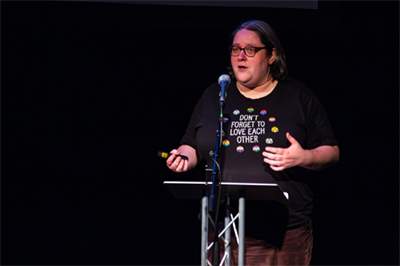
Byron and Vampires at the Nottingham Central Library
As part of the project, I've had the opportunity to give talks at a number of places, including two talks at the Nottingham Central Library - the first on Byron and Newstead and the second on Byron and the literary vampire!
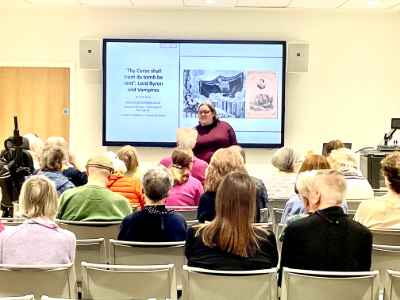
Exploring Byron's legacy with visiting secondary students
In collaboration with the education arm of the Nottingham City Museums service, I participated in the running of a study day for visiting secondary students. With Year 9s, we explored Byron's poetry of Newstead by walking in Byron's footsteps and recreating his first encounter with the house he inherited at 10 years old. Students analysed the poetry and completed their own project - to use photography to offer up an illustration of the mood, feel and theme of one of the Newstead poems!
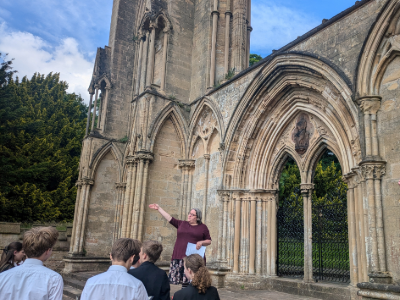
Object of the Month - A tree trunk with Byron's name on it!
This month's video explores an unusual object in the Newstead collection - a tree trunk which Byron carved with his name and that of his sister Augusta in 1814 during his last stay at Newstead. The video explores the relationship Byron shared with his sister and his domestic life at Newstead.
You can watch the video about the tree trunk here.
I was delighted to be able to share some of the research I've undertaken as part of this project through two publications around the bicentenary. In an article for The Conversation, I wrote about the practices of queer history, love and loss in Byron's poetry, and his relationship with John Edleston.
I also wrote a blog for the British Association of Romantic Studies to mark the day of Byron's death, by discussing his last days.
Newstead Byron Poetry Club
Every month I run an in-person and online version of the Newstead Byron Book Club for volunteers at Newstead Abbey. I select some of Byron's shorter poetry, provide a 'poetry pack' (which includes both the poetry and letters or journals from the time for context), make a recording of the poetry, and meet with volunteers to discuss Byron's work. Each meeting, we also look at one or more of the collection items which rarely come out of the archives. Volunteers are a vital part of running Newstead and it has been a joy to learn from them and learn with them as we discuss Byron's work.
The meetings have produced new insights into poems that I've read 100 times. Different perspectives bring different opinions, but is also a particularly unique experience to read poems where they were written or in a place which inspired them or simply in the home (and often inspiration) of their author.
You can find the poetry readings for the first four meetings online.
Byron's Newstead Poetry Online Reading
Byron's Edleston Poetry Online Reading
Domestic Pieces Online Reading
Darkness Online Reading
The Dream Online Reading
Byron's Travel Poetry Online Reading
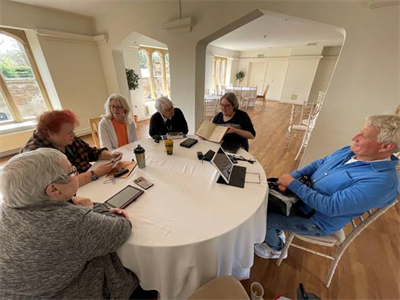
From left to right: Sue, Amanda, Trish, Olive, Me, Barry.
Byron Reading for the Byron Society
I was delighted to be invited by the Byron Society to give a reading as part of their bicentenary celebrations. I gave a potted overview of Byron's poetry of Newstead, tracing the developments of his poetry and relating it back to his history of the house. I memorised many of the verses, an exercise which has given me a greater love for and understanding of the poetry itself.
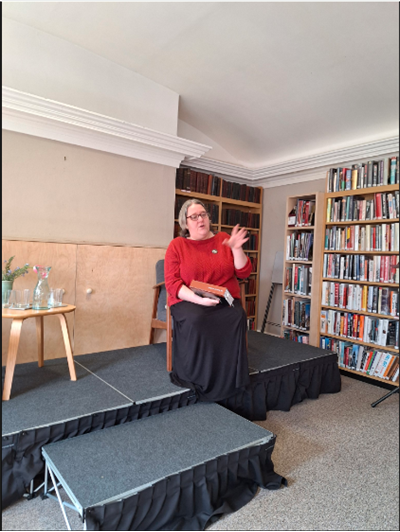
New Signs Round the Abbey Grounds
As part of my project, I have concentrated on Newstead Abbey specifically as a literary house and how the site can help facilitate access to and knowledge of not only Byron's life but his work as well. Part of that project has involved building a trail of Byron's words through the house and, now, the gardens. With extra funding from the University of Nottingham Institute for Policy and Engagement, I worked with on-site staff Leanne and Richard, and with film-maker Adrian Towell (from Nottingham City Museums) to design, to make and place a number of boards featuring Byron's poetry in the gardens. The boards also place the poetry within the context of Byron's life and particularly his life at Newstead.
The boards were a response to feedback from visitors that requested more information in the grounds.
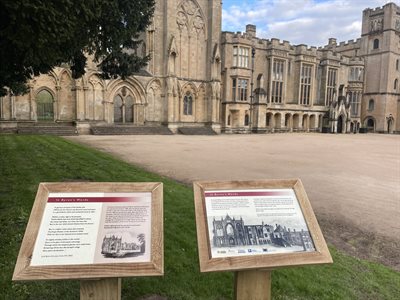
An Introduction to Byron's Poetry
To mark the bicentenary of Byron's death, Newstead Abbey held a two-day event. They collaborated with many partners offering a wide range of activities including spotlight talks with the curator, Simon Brown, lakeside 'Byron' rescues with the Newfoundland society, demonstrations of Greek and Regency dancing, craft activities, woodland trails and more!
I participated by running two talks and two workshops over the two days. I gave talks on Byron's relationship to Newstead Abbey and a talk introducing his poetry on Saturday. On Sunday, I ran a workshop on LGBTQIA+ history and one on Byron's connection to vampires.
There were lots of activities going on so numbers were quite low but we had visitors from near and far coming to discuss Byron, learn more about him, and be introduced to some of the amazing artefacts we have in the Newstead collection.
I also helped to organise costumed poetry readings around the house, based on the 'In Byron's Words' trail that I worked on through the house. The trail features quotes from letters or poems by Byron in each room with information tying it to the place, Byron's life, or his wider work. An amazing group of volunteers were stationed around the house reading extended extracts of the poems in various rooms. As part of the preparation, I held a number of 'poetry performance' workshops.
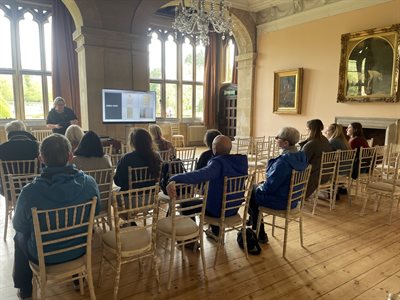
Object of the Month - Dog Collar
The third object of the month is a dog collar commissioned by Lord Byron. He had large numbers of animals throughout his life, including not only dogs but a bear, peacocks, an eagle, hedgehogs, tortoises and more. This video on the dog collar explores that relationship and looks at the story of the dog, Byron's beloved Boatswain, to whom the collar may have belonged.
Object of the Month - John Edleston Letters
The second object of the month was actually two objects. In the archives at Newstead, there is a selection of letters to, from and about Byron. We have two of his early letters to Elizabeth Pigot and her mother which relate to his relationship with John Edleston, Cambridge, and Edleston's tragic early death. These letters are an important piece of LGBTQIA+ history and give a real insight into Byron's early relationships.
You can come and see the letters in the house and see the full transcripts. After this month, the letters will be placed in the manuscript room as part of a larger display which includes Byron's poetry about Edleston and other items relating to this early relationship.
You can watch the video on the John Edleston letters where I read a number of sections of the letters and explore the story these fragments tell us about Byron's life and relationship.
Object of the Month - Byron's Will
Each month, this year, I have organised an 'object of the month' display. Material history involves interacting with objects and the stories that they tell us. My work focuses on creating encounters with these objects for visitors, diving into what they tell us about Byron and his life, and supporting this exploration with Byron's own words - from letters, journals, poems and even wills.
You can see the displays in the project lab at Newstead Abbey, but I've also created a series of videos so that people can encounter these objects from the Newstead Archive wherever they are in the world.
The first object of the month was Byron's will from 1811, in which he makes unusual stipulations for how his body is to be treated, and leaves notes on legacies and debts which give an insight into his relationships and priorities at the time. You can click here to watch the video on Byron's will.
Installing the new exhibit
This week, we've been installing new displays throughout the house to create new and exciting opportunities to encounter Byron's work and life. The curator, Simon Brown, has created a thematic display in the library, so you can delve into Byron's politics, his passions, his early life, his legacy and more. My own work is going on display through the house (in the library, manuscript room, and Edward III room) with displays on Byron and the Gothic, Byron and Vampires, Byron's relationship with John Edleston, and Byron's national and international afterlives.
In this video on installing the new exhibit, I give you a look behind the scenes at objects from the collection, explaining their relevance to the display on vampires, which explores Byron's impact on vampire literature and the controversies concerning the publication of John Polidori's 'The Vampyre' (wrongly attributed to Byron at the time).